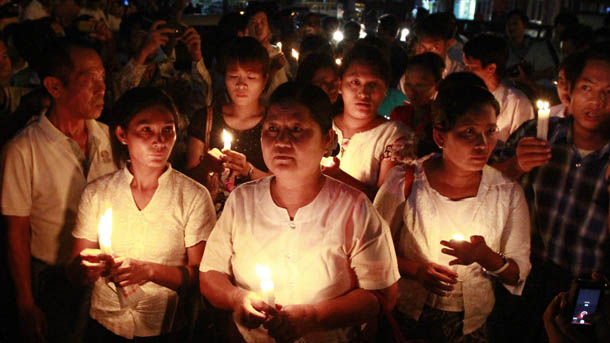Protesters in Rangoon and other cities around Burma have vowed to continue their demonstrations against power cuts on Wednesday, as calls for improved access to electricity turn increasingly into a test of the country’s recent democratic reforms.
“We want to use these protest to see how serious the government is about changing the country. They can arrest us if they like, but we’re not doing anything against the law,” said Han Win Aung, one of the organizers of the protests in Rangoon.
The protests, which started in Mandalay on Sunday, spread to Rangoon and several other cities yesterday. According to Han Win Aung, they will resume today at 6 pm with a planned procession that will begin near Sule Pagoda in downtown Rangoon and continue for about one hour.
“We want the government to know that we need 24-hour access to electricity. We don’t want the people to stay in the dark. That’s why we are doing this,” said the former political prisoner, adding that the protests were about basic needs, not political demands.
Burma has suffered from power shortages for decades, but the situation improved somewhat from early 2011 until April of this year, when routine brownouts returned. Since then, things have only gotten worse, with state-run media announcing on Monday that power would only be available in Rangoon for alternating six-hour intervals.
Particularly upsetting to many residents of Burma’s largest and most commercially important city is the fact that Naypyidaw, the new capital built by the former ruling junta, continues to have uninterrupted access to electricity.
“The government is discriminating against us, because Naypyidaw gets around-the-clock electricity, but we don’t,” said Han Win Aung.
Although the government has so far taken a soft line on the protests, even going so far as to make a rare plea for patience in the state-run media, protesters in Rangoon said they were ordered by the police to extinguish the candles that many carried as a symbol of their demands. The police also blocked their procession, forcing them to return to Sule Pagoda where they held prayers, they added.
There were also reports that about 40 leaders of the protests in Mandalay were briefly detained for questioning on Tuesday.
Naw Ohn Hla, another protest leader and a former political prisoner, told The Irrawaddy that such actions were not justified. “We have the right to do this because the country is a democracy now. We are simply expressing our desires in a peaceful manner,” she said.
Besides the resentment expressed by some protesters over Naypyidaw’s privileged status, many others lashed out at the government’s decision to sell most of Burma’s energy resources to neighboring countries.
“The government says the country produces a lot of gas, but almost all of it goes to China and Thailand,” said one Rangoon teacher who took part in Tuesday’s protest. “They don’t seem to care if we stay in the dark forever.”

















